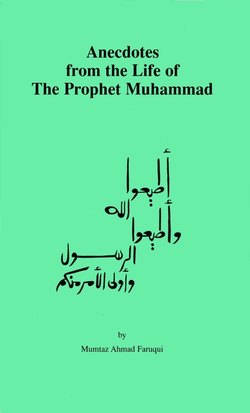Читать книгу Anecdotes from the Life of The Prophet Muhammad - Mumtaz Ahmad Faruqui - Страница 11
На сайте Литреса книга снята с продажи.
The Flight
ОглавлениеThe persecution of the Muslims grew in intensity to the extent that not only their means of livelihood were blocked, and their movements restricted, but their very lives were threatened. At that time, the Holy Prophet asked his followers to migrate to Abyssinia, a Christian country in Africa. Consequently, a group of Muslims, including women and children, emigrated to Abyssinia. The infidels even chased them to that African country, and tried to prevail upon the Negus, the King, to hand over the fugitives to them. Negus heard the case of the Muslims and was so favorably impressed by them that he allowed the Muslims to stay there in peace.
Some people from Medina, a town about two hundred miles to the north of Mecca, had come on pilgrimage to Mecca, and having heard the message of Islam, accepted it. They entreated the Prophet to grace their town with his presence. It was the thirteenth year of the Call and the conditions had become almost intolerable for the Muslims in Mecca. A number of them left by ones and twos for Medina, but the Prophet and a few of his close companions stayed on. Finally, the tribal leaders in Mecca met secretly, and decided to slay the Holy Prophet on a particular day when the Prophet would emerge from his house in the morning. By that time, not only Abu Talib, the uncle of the Prophet, had died but, what was more saddening for the Prophet, his good and faithful wife, lady Khadijah, had also passed away.
The Prophet came to learn of the evil intentions of his enemies through Divine revelation, and permission was given to him to migrate to Medina. He asked Ali, his cousin and companion, to stay behind to settle certain transactions and to follow them later on. Abu Bakr, the Prophet’s close friend, was to accompany him. In the dead of the night, the two quietly slipped away from the town, and took shelter in the cave of “Thaur,” about three miles away from Mecca.
Next morning the enemy, finding that their prey had fled, formed a posse and tracked the fugitives almost to the mouth of the cave. Hearing their voices and the sounds of their footsteps, Abu Bakr felt afraid that they would soon be discovered. In this extremely critical situation, the Prophet did not despair. He remarked, “Do not be grieved, for surely Allah is with us.” This tranquility of mind could only have been Divinely inspired. It is also related that after the two fugitives had taken shelter inside the cave, some spiders had spun a cobweb across the rather small entrance to the cave, and a bird was seen nesting in a niche at the entrance. This seemed to have misled the trackers completely because they did not suspect the presence of any human being inside the cave; the trackers went away to search for the two fugitives elsewhere.
For three days and nights the fugitives remained inside the cave. Asma, daughter of Abu Bakr, secretly brought them food, while Amr, the servant of Abu Bakr, would drive his goats to the vicinity of the cave, and thus manage to serve them with goat’s milk. The enemy gave up the search after three days but they proclaimed a reward for whoever captured the Prophet, dead or alive. The two fugitives, finding the coast clear, continued on their trek to Medina. One day they saw an armed horseman coming after them. They waited for him to come near and saw him fit an arrow in his bow and prepare to shoot at them. Just then the rider’s horse stumbled and its feet sank deep into a sand-pit; the rider himself was thrown off. Suraqa, the horseman, is reported to have recounted the incident later on thus: “Then it transpired to me that it was preordained that the Prophet’s cause should triumph.” Abandoning his evil intentions, Suraqa approached the Prophet with a penitent heart and begged his forgiveness. The Prophet forgave Suraqa, and gave him the good news that he had seen in a vision that Suraqa was wearing the gold bangles of the ruler of Persia on his wrists. It may be remarked in passing that about twenty-four years later, in the regime of Caliph Umar, when Persia fell, Suraqa was sent for and made to wear the gold bangles of the Chosroes that formed part of the spoils.
The Prophet and his companion, Abu Bakr, finally arrived safely in Medina where they were welcomed by the Muslims and the local gentry. Here the Muslims were at last free to observe their religious duties without interference. The enemy at Mecca, however, were out to destroy this new religion and its founder before it got too strong for them. The Prophet and his small band of the faithful consequently had to fight at least three major battles for survival before the tide turned. Eventually, the Muslim forces, having grown sufficiently strong, turned the tables on the enemy.
